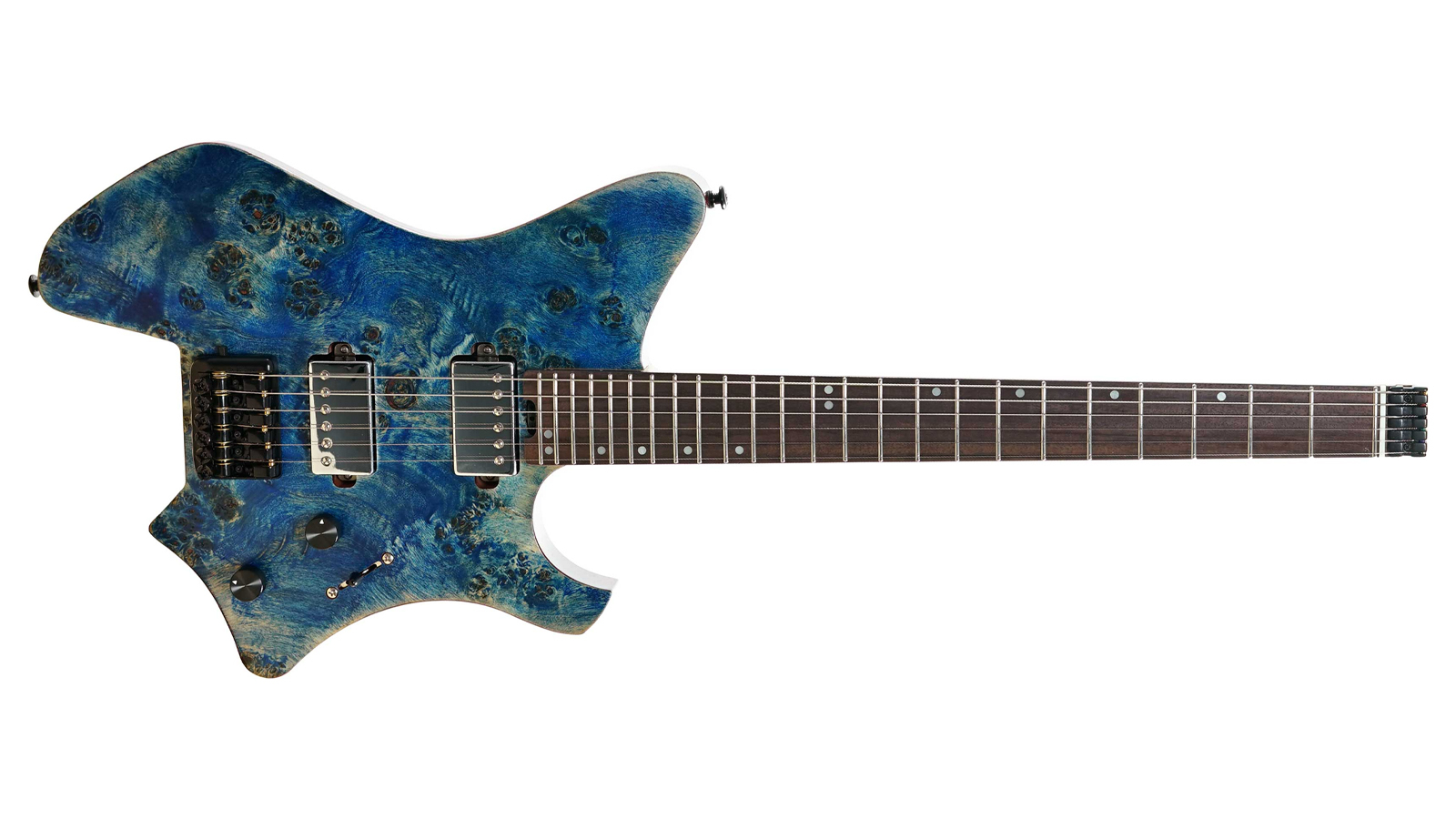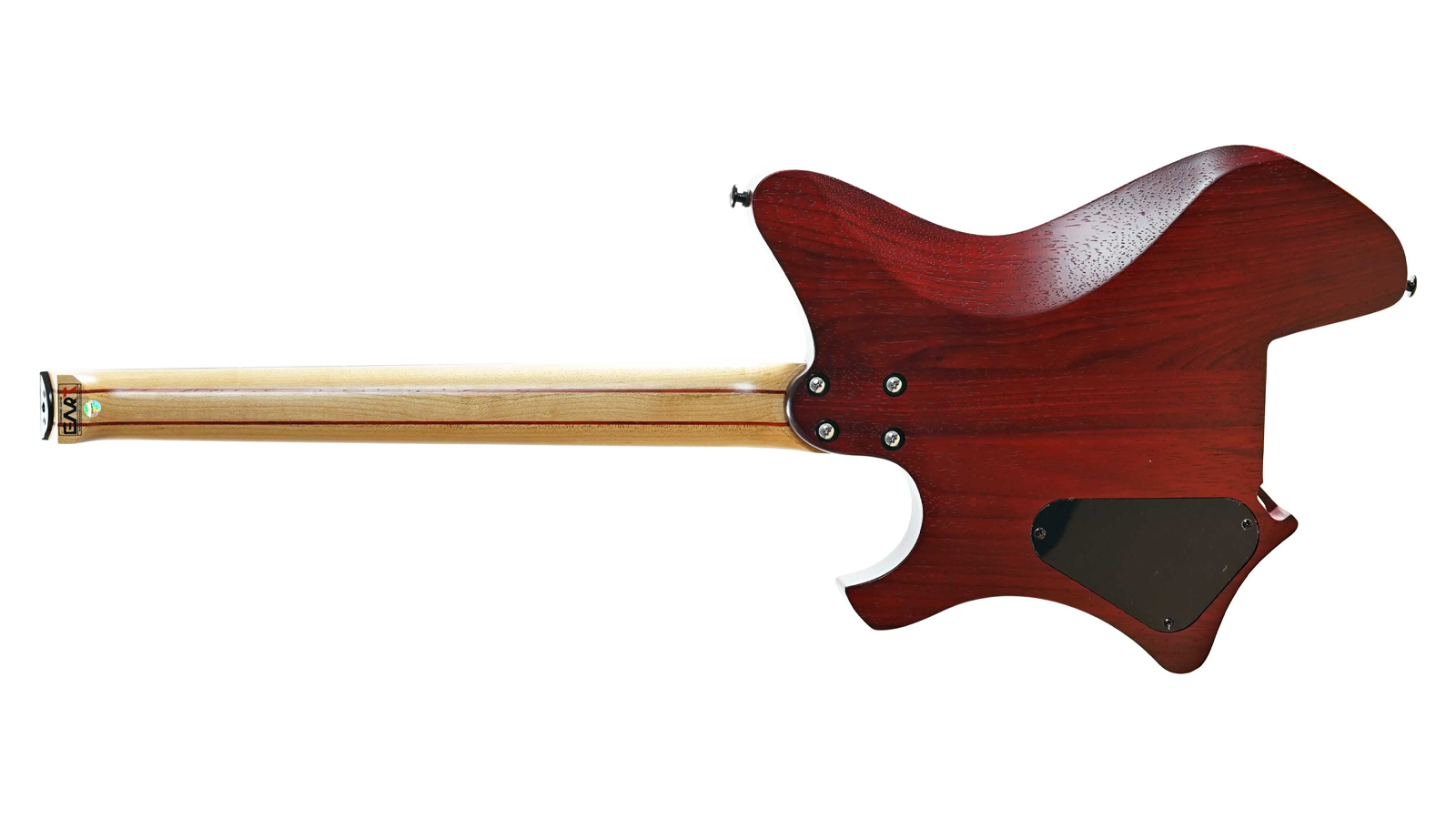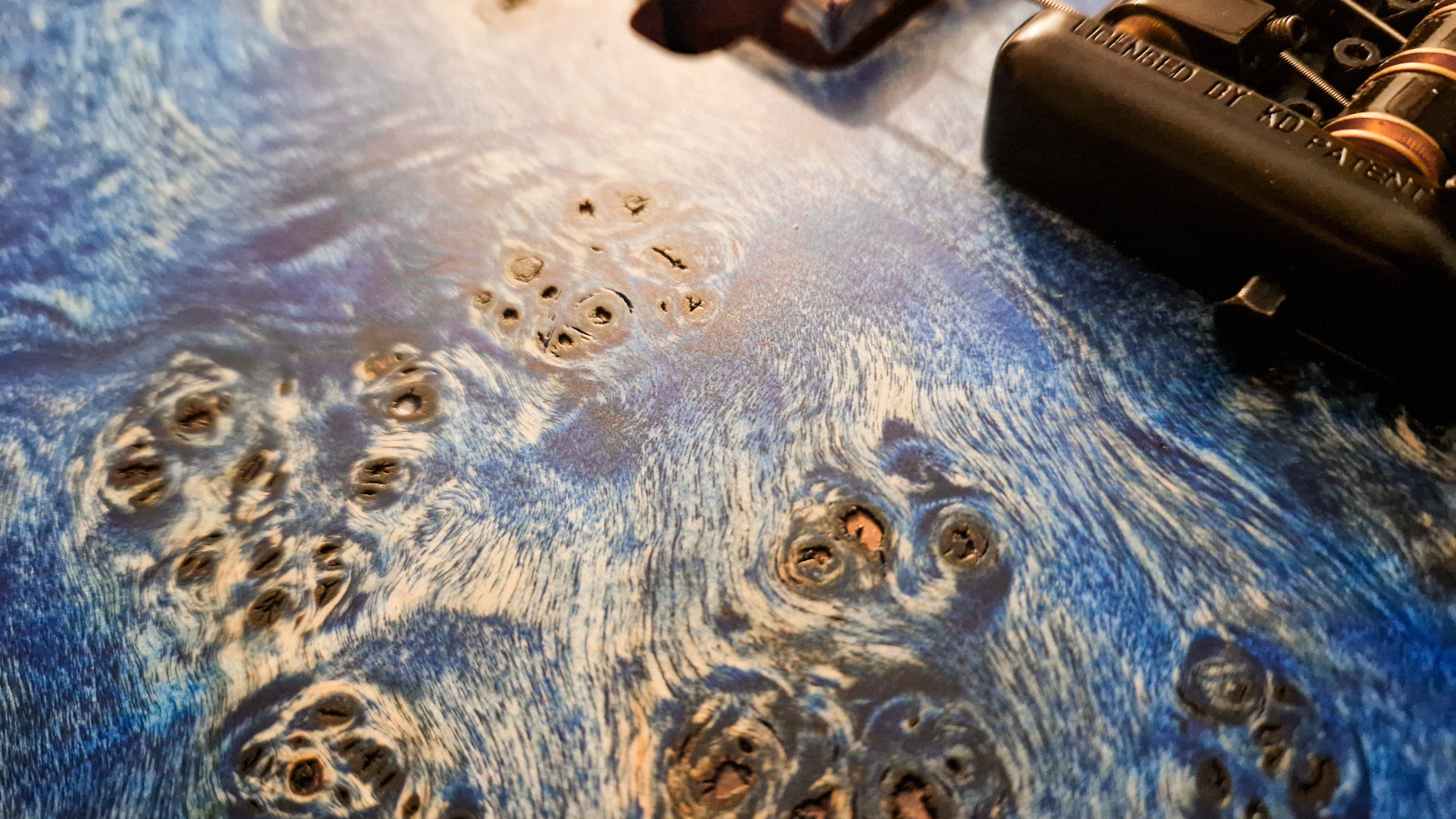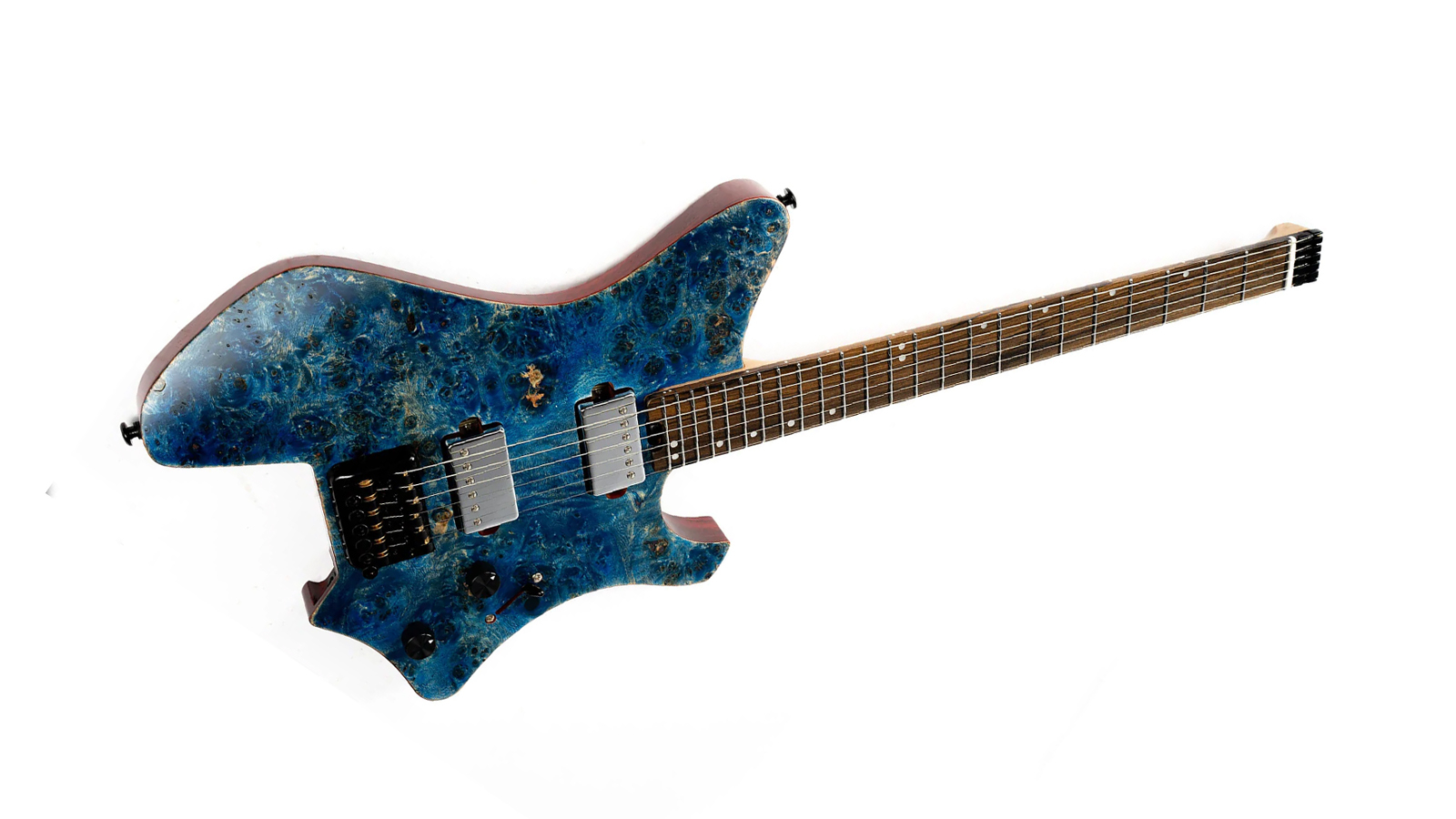MusicRadar Verdict
Okay, if you are in the market for a high-performance headless guitar, you aren't exactly short of options. Brands like Strandberg, Kiesel and Legato dominate the market, but they all have one thing in common, a fairly hefty price tag. EART, on the other hand, offers a fairly impressive range of specifications with superb playability for not a lot of cash at all - proving they can most certainly hang with the big guns.
Pros
- +
Very comfortable
- +
Bright and articulate pickups
- +
Tuning stability is ace
- +
Very well finished
Cons
- -
It takes a certain amount of concentration not to fall off the end of the neck
- -
The look isn't for everyone
MusicRadar's got your back
EART Guitars GW-2 review: What is it?
EART Guitars are a relatively unknown brand, so you'd be forgiven for not knowing an awful lot about them - but let us fill you in. EART is a guitar manufacturer from China that seems to have its sights set firmly on providing the best possible instruments they can at the lowest possible price.
With an ever-expanding catalogue of six-strings - and four-strings - EART produces a number of electric guitar models. These range from classic S-types to blues-ready hollowbody guitars and, of course, some shred-tastic metal monsters as well.
The exact model we are looking at today is the EART GW-2 in Trans Blue, which features a plethora of contemporary features, such as a compound radius fingerboard, stainless steel frets, an exotic roasted Padauk body, burled maple veneer and a 5-piece neck. This is a guitar that is clearly built with serious players in mind, but how does it hold up against the big names of this niche guitar style? Well, let's find out.
EART Guitars GW-2 review: Performance & verdict

Design and playability
Okay, before we get into the nitty gritty of this ultra-contemporary guitar's spec and performance, let's first address the headless elephant in the room. Beloved by the more, shall we say, experimental guitarists, this design has flourished in recent years with those looking to push the boundaries of what is possible on the instrument adopting this radical-looking axe as a symbol of their rebellious spirit.
Now, whether you like the look of this decapitated guitar or not, you can't deny there are some perks to not having the peghead at the end of the neck - better balance, lightweight, and superior tuning stability, to name a few - and each of these is beautifully displayed on the EART GW-2.
First of all, this guitar is exquisitely comfortable. In the sitting or standing position, the GW-2 sits perfectly perpendicular with absolutely no movement whatsoever. This meant we could play for hours and hours without feeling any strain - and we really did lose hours of our life playing this guitar. EART has opted for a compound neck profile on the GW-2, which morphs from a narrow, rounded feel at the first fret to a flatter, wider feel up at the dusty end.
Now, while the neck still feels very natural, there is more of a pronounced change once you clear the fifth fret. This is particularly noticeable when compared to the likes of the Fender Ultra series - which opts for the slightly different compound radius of 10" to 14", rather than EART's 9.5" to 14". The Fender has a smoother transition, making the switch between the radius a lot more seamless. This isn't to take anything away from the GW-2, it just simply doesn't feel as refined as its Californian confrère - that said, the difference in prices is astronomical.

While we are talking about the neck, it seems like a good time to bring up the stainless steel frets which pepper its rosewood fingerboard. EART says that all the frets are hand polished, which, we must say, you can tell. Not only are the frets gleaming, but they are also expertly dressed, with no sharp edges or dead spots - something other budget brands should be taking note of!
The bridge chooses to forgo the traditional fine tuners found on the likes of Kiesel or Strandberg and instead uses a key system for tuning each string. When it's not in use, the tuning tool sticks magnetically to the side of the bridge. In theory, this is a rather clever design, but in practice, we feel it isn't the most practical. We wouldn't want to be on a dark stage fumbling around for the key to tune our guitar while a bemused audience looks on.
The crooked and abstract body is made of roasted Padauk, which feels reassuringly weighty without being heavy, and is topped with a poplar burl veneer. Our example arrived in a striking trans-blue finish, which, when combined with the swirls of the burl veneer, results in a top that even Van Gogh would be proud of. It's worth noting that the veneer here is paper-thin, and while it looks pretty great, a thicker top would help create a better contrast with the two materials used to make up the body, and it wouldn't wear down as easily - mind you, at this price, you can hardly complain about a thin top, can you?

Sound
Okay, that brings us to the sound of the GW-2, and again, the praise for this charming little fusion machine doesn't lighten up. Loaded with a set of EART Classic 57 Alnico V humbuckers - which are made in Korea - this guitar sounds bright, articulate, and well-balanced.
While the tone is a little pushed when compared to the likes of a Gibson SG or Les Paul, the output isn't too aggressive, resulting in a guitar that feels sonically versatile. Obviously, metalheads may prefer a higher output, but with the price of the GW-2, a new set of face-melting pickups won't completely destroy your budget.
It has to be said, we actually found ourselves favouring the warmer tone of the neck pickup on a clean Fender Twin-style setting with plenty of reverb, of course. In this environment, the GW-2 really came into its own, delivering a round, harmonically rich tone that was a joy to play.
EART Guitars GW-2 review: Final thoughts
With the prices of electric guitars going up and up over the last few years, it's refreshing to see a company putting out affordable alternatives to the increasingly more unobtainable boutique builders that dominate this particular corner of the guitar space.
The EART GW-2 shows just what is possible when a budget-friendly brand focuses on the finishing of its instruments and not just cutting costs. For us, if you're in the market for a high-performance, headless metal guitar, then you'd be mad not to check out the EART GW-2 before looking at the more mainstream names - we think you'll be pleasantly surprised.
EART Guitars GW-2 review: Hands-on demos
Phillip McKnight
Guitar MAX
EART Guitars GW-2 review: Specifications
- Model: GW-2
- Scale: 25.5" (648mm)
- Body: Roasted Padauk with poplar burl veneer
- Neck: 5-Piece Roasted Maple/Padauk
- Fingerboard: Rosewood, dot inlay
- Fingerboard Radius: 9.5’-14' compound radius
- Nut: Bone 42mm+ zero fret
- Fret: 24F Medium Jumbo Stainless Steel
- Neck Profile: Compound U to C shape,20+-0.5mm at 1th fret,21+-0.5mm at 12th fret
- Joint: Bolt-On
- Pickups: EART Custom covered classic 57 Alnico V humbucker made in Korea
- Controls: 3-way switch,1 tone,1 volume
- Bridge: Fixed hardtail headless system
- Neck finish: Satin natural
- Contact: EART

I'm a Senior Deals Writer at MusicRadar, and I'm responsible for writing and maintaining buyer's guides on the site - but that's not all I do. As part of my role, I also scour the internet for the best deals I can find on gear and get hands-on with the products for reviews. My gear reviews have been published in prominent publications, including Total Guitar and Future Music magazine, as well as Guitar World.com. I've also had the privilege of interviewing everyone from Slash to Yungblud, as well as members of Sum 41, Foo Fighters, The Offspring, Fever 333 and many more.
I have a massive passion for anything that makes a sound, particularly guitars, pianos, and recording equipment. In a previous life, I worked in music retail, giving advice on all aspects of music creation and selling everything from digital pianos to electric guitars, entire PA systems, and ukuleles. I'm also a fully qualified sound engineer who holds a first-class Bachelor's degree in Creative Sound Production from the University of Abertay and I have plenty of experience working in various venues around Scotland.
“Excels at unique modulated timbres, atonal drones and microtonal sequences that reinvent themselves each time you dare to touch the synth”: Soma Laboratories Lyra-4 review
“I used everything I knew about music”: How Green Day exceeded expectations with their most ambitious song
YouTube just added AI tools that makes musicians, library music and video editors redundant










